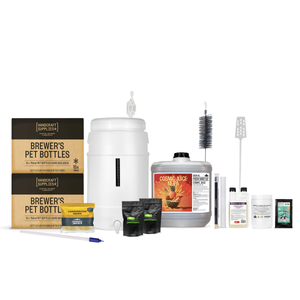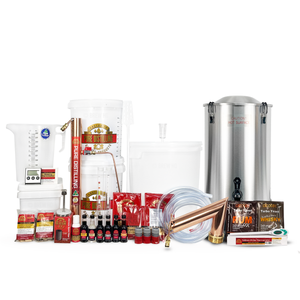
VH7 Bevelled Edge Agglomerate Cork - 38x21mm
High quality agglomerate corks for packaging wine and mead.
The agglomeration process is a technique used in the production of wine corks to create cork stoppers. This process involves the transformation of cork granules into a cohesive and uniform material. The agglomeration process results in wine corks that maintain the natural characteristics of cork while offering uniformity and reliability. These agglomerated corks are widely used in the wine industry due to their consistent quality and cost-effectiveness compared to one-piece natural corks.
These VH7 corks, also known as #7 corks are typically used by winemakers who would prefer to cork their wine or meads by hand. If you have a wine corker we would recommend using VHA corks for a more reliable seal.
Dimensions:
Width: 21mm
Height: 38mm
Corking Instructions:
-
Prepare: Before you begin, ensure that your corks are clean and sanitized. Soak the corks in a rinse free sanitizing solution for a few minutes. This step helps prevent contamination of the wine during the corking process.
-
Prepare the Bottles: Make sure your wine bottles are filled with the desired wine, leaving the appropriate headspace at the top. The headspace allows for expansion and contraction without causing pressure issues and corks popping out of the bottles.
-
Sanitize Corking Equipment: If you're using a corking device, make sure it is clean and sanitized. Sanitize any parts of the equipment that will come in contact with the corks or wine.
-
Soak Corks (If Necessary): Some corks may benefit from soaking in a bowl of warm water for a few minutes before corking. This can make them more pliable and easier to insert into the bottles. We do not recommend soaking agglomerate corks, if you choose to do so ensure to only soak them very briefly.
-
Position the Corking Device: Set up your corking device on a stable surface. Ensure that it is adjusted to accommodate the size of the cork and bottle you are using.
-
Insert the Cork: Take a sanitized cork and place it into the corking device, ensuring that the narrow end of the cork is facing down. If you soaked the corks, make sure to drain any excess water before inserting them.
-
Position the Bottle: Place the filled wine bottle under the corking device, aligning the corking chamber with the mouth of the bottle.
-
Cork the Bottle: Activate the corking device according to its instructions. This typically involves pulling a lever or pressing a button to lower the cork into the bottle. The corking device will compress the cork and insert it securely into the bottle.
-
Inspect the Seal: After corking, visually inspect the cork to ensure it is fully inserted and forms a tight seal. A well-sealed cork will help prevent oxidation and maintain the wine's quality.
-
Store the Bottles Properly: Store the sealed wine bottles in a cool, dark place with a consistent temperature to allow the wine to mature properly.


